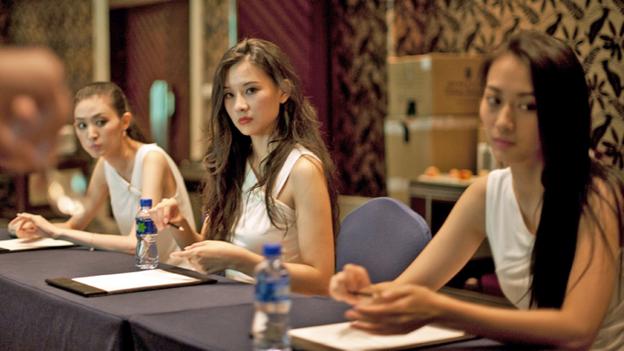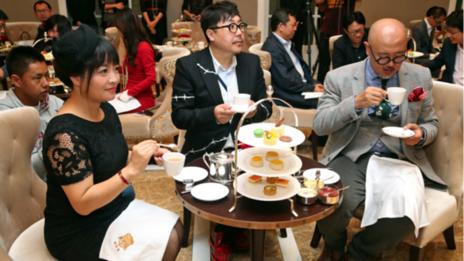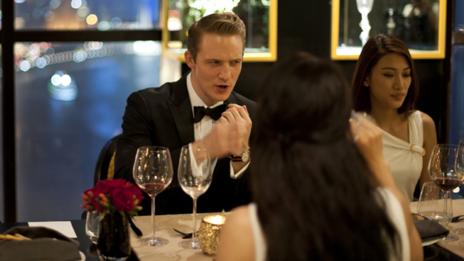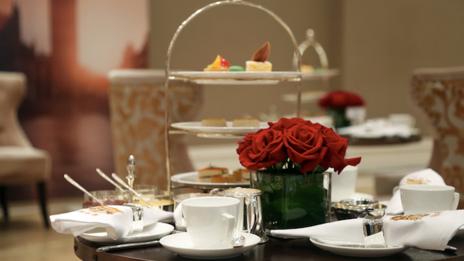Western manners: The latest Chinese status symbol

iss China 2014 contestants learn etiquette from a Seatton instructor. (Darcy Holdorf)
Five Chinese women are sitting upright in their chairs, designer handbags at their heels, listening attentively to a trendy Chinese Tatler magazine photographer describe how to pose in public. He is talking makeup, light and cheekbones. The room is decorated with Pierre Frey wallpaper and the participants sip tea out of a Bernardaud tea set. Notepad in hand, they are learning the dos and don’ts of camera etiquette.
The course entitled “How to pose elegantly in front of the camera” is one of many offered by Institute Sarita, a modern-day version of European finishing schools that caters to Chinese nouveaux riche. Other courses offered by the school, located in the trendy Sanlitun district of Beijing, include how to raise children, proper table manners and luxury brand pronunciation.
“Most of my clients had an embarrassing moment, overseas or during a business dinner. They come here because they want to make thing easier for themselves,” said Sara-Jane Ho, the perfectly groomed school founder, as she sat in a drawing room furnished with imported French antique furniture.
“It’s mostly learning about how to behave in an international environment,” said Ho, who herself studied etiquette at the Institut Villa Pierrefeu in Switzerland, one of the last proper finishing schools in the world. So far she has attracted a couple hundred wealthy Chinese to her courses. She is opening a Shanghai branch in May.
With 190 billionaires and more than two million millionaires, China tags just behind the US in number of high-net-worth individuals, according to research from Forbes magazine and Boston Consulting Group.
Many of these fortunes have grown rapidly, in lock-step with China’s newly expanding economy and multiplying business opportunities. Some who find themselves newly wealthy have little knowledge or training in how to behave in international business or social events.
"The country was so isolated 30 years ago," said Ho. "The spike in wealth has happened in a compressed time. This transformation has created a lot of pressure on individuals."
As a result, some businesspeople may appear uncouth and blunt to their western or Asian counterparts. Finesse, on the other hand, can smooth many business transactions. “Simply knowing how to be comfortable with a knife and fork can be a deal clincher,” said James Hebbert, who represents Seatton, a British etiquette school in China.
Filling a niche
Clients who attend etiquette courses in China include government officials, children enrolled in overseas schools, wives looking to entertain important guests and those who enjoy travelling abroad.

Participants learn everything about a traditional English afternoon tea. (Seatton)
“There is a huge demand all along the spectrum,” said Hebbert, whose clients were first primarily drivers of Rolls Royces wanting to dress the part, then evolved to middle-class customers in search of a British-lifestyle experience. “In just a few years, I have seen a real shift in clientele. More and more Chinese are travelling. They see the advantage of having an international edge.”
If learning how to peel an orange with a knife and fork may seem slightly superfluous in Europe, in China the newly rich are ready to pay what it takes to acquire the manners that come with their new status.
“The next time I visit Milan and dine in a nice restaurant I can confidently tell my husband he shouldn’t hold his knife like a dagger,” said a participant of a two-hour Western dining etiquette course with James Hebbert in Shanghai, who didn't want her name used.
Hebbert charges 20,000 yuan ($3,243) per group of 10 for an afternoon session.
Institute Sarita’s most popular course, “Hostessing”, costs 100,000 yuan ($16,216) for 12 days in which the client learns skills ranging from engaging in small talk to pairing wines with a meal.
Lack of manners
Media and even the Chinese president have been critical of how some Chinese travellers have behaved on trips. On a September trip to the Maldives, Chinese President Xi Jinping suggested Chinese citizens be “a bit more civilised when travelling abroad.”
With more than 100 million Chinese travelling in 2014, misbehaviours have grabbed headlines worldwide. Among the most extreme: defacing an Egyptian sculpture, throwing boiling water on a flight attendant andurinating outside.

Miss China 2014 contestants receive training by a Seatton expert. (Darcy Holdorf)
In October, China’s National Tourism Administration issued strict guidelines on how to behave while travelling. In a 64-page booklet, Chinese tourists are warned against peeing in swimming pools, stealing life jackets from planes and leaving footprints on the toilet seat. Punishments for such behaviours include fining tour operators and blacklisting rude tourists.
“The Chinese have no manners. It’s just not something that is taught by parents. I am always surprised when men hold the door for me in Paris. This would never happen in China,” said Yue-Sai Kan, a Sino-American TV host and producer, and author of Etiquette for the Modern Chinese, a national bestseller that has sold more than three million copies. Today, Kan lectures on etiquette and trains Chinese contestants for the Miss Universe contest.
While some of what is perceived as rude by Westerners stems from cultural issues — the notion of public space and privacy is very different in China — other ill-manners date back to the Cultural Revolution when all that was seen as sophistication was considered bourgeois and severely punished.
“Let’s say that when you’re struggling to get food you are not thinking about private space,” Ho explained.
What can seem to an outsider as impolite today — such as pushing, queue barging, speaking loudly or picking your nose in public — is common behaviour for the majority of Chinese. But as China opens up and engages with the world awareness is growing among the population on how they are being perceived overseas.
A new face
To disassociate themselves from this reputation, many of the new elite are seeking refinement at etiquette schools. At the same time, they are looking to good manners as a new form of status symbol.

Afternoon tea etiquette training begins with props. (Seatton)
“[The Chinese] understand that their position as the most powerful country in the world puts them in a situation where they need to learn about other cultures and behaviours so as to smoothen political and business relationships,” said Viviane Neri, principal of Institut Villa Pierrefeu, in an email.
“Before, it was about owning a big car,” said Hebbert. “Now the rich are looking for something else to make the difference.”
Changing the tastes of China (audio report)
Chinese food giant Bright Food Group Co is on a mission to acquire Western food brands and change the tastes of China. The BBC’s World Business Report delves into the company's acquisition of a major cereal brand in the UK and a pork company in the US:
No comments:
Post a Comment
Comments always welcome!